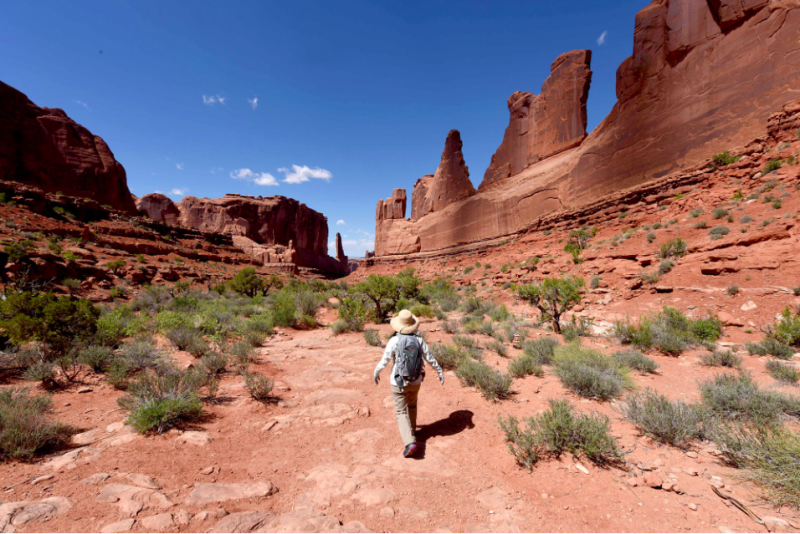Climate change could affect human evolution. Here's how. Global warming will likely alter the internal workings of our bodies — and cause a noticeable shift in our appearance.

As climate change brings rising temperatures, droughts, shifting patterns of precipitation and longer growing seasons, plants and animals are evolving to keep pace.
Biologists have observed squirrels and salmon developing at an accelerated pace, causing them to reproduce at a younger age. Earlier summers have caused some flowers to bloom earlier in the year. And corals are forging new relationships with microscopic algae to survive in warmer, more acidic seas. As the planet continues to warm, evolutionary changes are expected in other species as well — including Homo sapiens. Climate change will alter the internal workings of our bodies in subtle but significant ways and will likely cause a noticeable shift in our appearance.
Inside the Body:
A warmer climate means malaria, West Nile virus and other diseases long confined primarily to the tropics will spread into temperate zones. As a result, people living in the U.S. and other developed nations will be exposed to these illnesses, and our immune systems will be forced to evolve new defenses. That, in turn, could cause other, noninfectious diseases. Two blood disorders — sickle cell and thalassemia — arose and continue to exist because they have a beneficial side effect: resistance to malaria. Such disorders, or new ones, may soon appear if malaria moves into populated areas of North America, East Asia and Europe. Similarly, our digestive systems will evolve in response to shifts in food availability — where crops and livestock can be cultivated. The ability to digest milk in adulthood evolved among groups in the Middle East and North Africa that began raising cattle. Future generations may evolve better abilities to tolerate sugar or fat. Changing diets will also trigger changes in our microbiomes — the bacteria and other microorganisms that live in our guts and help to keep us healthy. Vegetarians tend to harbor a different mix of bacteria than meat eaters, and these changes could be exaggerated if prolonged droughts make it too costly to raise livestock for meat.
External changes
While these changes will be of enormous interest to biologists, they will be largely invisible. But as we change on the inside, we’ll also be changing on the outside. Evidence suggests that a warming planet could melt away differences between human races — or population groups, as scientists more accurately call them.
The reason why climate change could reduce racial differences is that it will trigger massive migrations. In recent decades the world has become more urbanized, with people moving into large cities in coastal areas. But as polar ice melts and sea levels rise, large numbers of people will be forced to flee the coasts. And as droughts become more common and more severe, people living in more arid areas will have to move to places with more reliable sources of water.
Environment
These migrations will erode the geographic barriers that once separated human populations. In fact, this process is already underway. As of 2017, 258 million people were living in a country other than the one they were born in — an increase of 49 percent since 2000, according to a report from the United Nations. A World Bank report released in March predicts that climate change will cause 140 million people to migrate by 2050, with those now living in sub-Saharan Africa, South Asia and Latin America especially likely to migrate. One consequence of large-scale migrations is what biologists call gene flow, a type of evolution caused by the blending of genes between populations. When people from different populations mate and reproduce, their genes intermingle in their children. That can lead to combinations of traits not seen in either parent or in the populations they come from — like the dark skin and blue eyes of Cape Verde islanders, the result of interbreeding between Portuguese and West Africans.
Shifting skin color
One of the most obvious effects of gene flow may be greater similarity in skin color. Skin color differences came about a result of natural selection in different human populations. The pigment eumelanin makes skin darker, which helps protect against harsh sunlight. But too much eumelanin can make it hard for the body to produce vitamin D, which is needed to build healthy bones. So over many thousands of years, human populations evolved varying levels of skin pigmentation as they spread across the globe, with natural selection balancing the cost of having too much eumelanin (which can indirectly cause bone deformities) versus having too little (which can lead to cancer and birth defects). As a result, skin color came to closely match the intensity of sunlight in different regions — darker near the equator and lighter near the poles.
But in today’s world, with sunscreen and vitamin supplements, natural selection is less relevant to ongoing changes in human skin pigmentation than gene flow. Because skin color is controlled by many genes, parents whose skin color differs tend to have children with intermediate skin tones. And so in five to 10 generations (125 to 250 years), we may see fewer people with dark skin or pale skin and more with a brown or olive complexion. Having both dark skin and light eyes may become more common. Blending of races is already well underway in ethnically diverse countries like Brazil, Singapore and the U.S. A Pew report from 2017 found that the number of multiracial births in the U.S. rose from 1 percent in 1970 to 10 percent in 2013. And the increase will continue — the multiracial population is projected to grow by 174 percent over the next four decades.
The bottom line? As people around the world become more physically similar to one another, it's possible that racism might slowly fade.




Basically, this is evolution in action: an organisms adaptation to a changing environment.
Is that micro or macro evolution? Just kidding. Interesting and entertaining article.
Glad you like the article.
Very cool article Gordy. I never thought about how global warming will affect humans, but of course, it would. Adapt or die. That is the nature of things... so to speak.
Thank you.
Indeed. After all, just look at modern humans and how different groups adapted to better suit their particular environments: darker pigmentation in African populations to protect them from the sun. Also the sickle cell trait predominant in the same population to protect them from malaria. Lighter skin tones in northern Europeans in response to less direct sunlight. Eyelid folding ("slant eyes) in Asian populations, ect..
That's simple natural law. It will be interesting to see how humans adapt and evolve over the coming centuries. To say nothing of how we'll adapt and evolve in response to long term space travel (or possible exosolar colonization) as technology progresses.
we gotta deal with overpopulation
The chances of that happening are slim and none. The only other option is learning to clean up the environment, or, ignore it and let it wipe us out. Overpopulation is a HUGE problem for many reasons, (to name just a few);
1) Climate change...warmer oceans, disrupted ecosystems, broken food chains.....less food.
2) More people, less places to grow crops that will survive in warmer temps...less food.
3) Big industries relying more on automation, fewer jobs but more people, less money to buy food, (which by that time will be so expensive, only the rich will be able to afford it anyway). This one, no matter how you look at it, the number of jobs available on a global scale are decreasing, but the population is increasing.
Short of an, "Infinity War" solution, we as a species better make some drastic changes in the way we treat the environment or the next 50 years are going to be very ugly.
But will not global warming cause more land to become available for farming/grazing? Think of areas such as Greenland, northern Canada, Siberia and eventually Antarctica. Even if the newly exposed land is relatively arid, has Israel not made the desert blossom? As well technology is enabling increased crop production, some of it becoming more beneficial environmentally, such as the Israeli-invented drip-irrigation system.
I once read that if someone could make two ears of corn grow on a stalk, instead of the normal one ear, that person would have done more for the benefit of humanity than all the politicians of the world put together.
Not necessarily. Newly uncovered land may not be arable for agriculture, especially if warming causes a loss of water supplies.
Israel also has a much smaller population comparatively. So they can maximize the use of arable land to meet population needs. But that not work on a larger scale if there is a larger population but less usable land for effective agriculture. Don't forget, warming can destroy ecosystems, including plants, which might otherwise make land use sustainable.
With GMO crops, maybe, just maybe.
Someone choosing to not be a politician has already done more for humanity than all politicians.
LOL
Nature itself has a way of dealing with that.
"In fact, this process is already underway. As of 2017, 258 million people were living in a country other than the one they were born in."
Is that because of the watered down, name changed "Global Warming", or is it because they weren't happy with the place they were living in, in the first place ?
I heard that "Migration" back in the Old, Old, Old, Old, Old days was a good thing, and NOT caused by global WARMING.
"As people around the world become more physically similar to one another, it's possible that racism might slowly fade."
Is that what this article REALLY boils down to ?
It sounds like the human race is gonna get a lot better looking
An excellent and interesting article, Gordy. I assume that one of the physical changes that could take place is for humanity not to develop body hair. The body hair (arms, legs, chest, back, etc) is a leftover from Neanderthal days when it may have been required for warmth. I have noted that Chinese people have almost no body hair whereas some Chinese people have been quite wondrous at my proliferation of it (except on my head, LOL). (When I was 18 and at a summer camp I was voted as having the second most hairy shoulders in the camp.)
Thank you.
A lack of body hair might be an adaptive response to man being able to alter his environment, such as wearing warm clothes or using heat sources in colder conditions.
I think if we lived in Paleolithic times, a lot of this stuff - or something similar - could certainly happen. But today, we do not live our lives as slaves to the environment. If we're low on Vitamin D, we don't get lighter skin, we take a supplement. If it's hot, we turn on the A/C. If it's cold, we put on a sweater. We don't just stay in one place, we travel and migrate all over the world. Where disease spreads, we don't die off in favor of people who develop natural resistance. Instead, we marshal our medical science and develop treatments and cures.
If the Singularity is to come within the next 15 years. I think future humans would look more like this.
